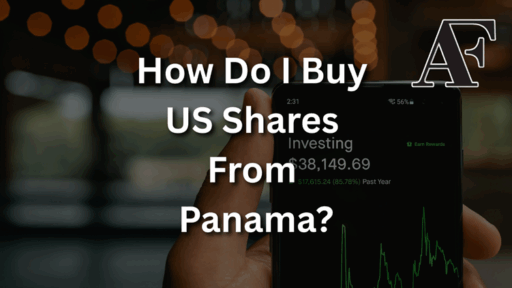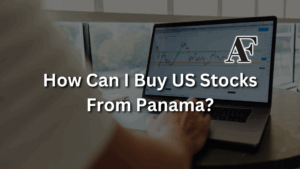Panamanian residents can legally invest in US stocks through various channels, such as an international brokerage that accepts clients in Panama. Once approved, you can fund the account and trade US stocks online.
The territorial tax system in Panama makes foreign investments tax-free locally. However, US tax obligations and proper documentation are essential considerations.
In this guide, we will discuss some of the important aspects of purchasing US stocks from Panama, such as:
- Can I invest in the US stock market from another country?
- How to buy US stocks from Panama
- Can I keep my brokerage account if I move abroad?
- Tax on US stocks
- Are US stocks a good investment?
My contact details are hello@adamfayed.com and WhatsApp +44-7393-450-837 if you have any questions.
The information in this article is for general guidance only. It does not constitute financial, legal, or tax advice, and is not a recommendation or solicitation to invest. Some facts may have changed since the time of writing.

Can I invest in the US stock market from abroad?
Yes, foreign nationals can invest in US stock markets. There is no citizenship requirement to buy US-listed securities, provided investors meet identification and tax documentation requirements.
US securities laws protect all investors equally, regardless of nationality. The same disclosure requirements and market protections apply to everyone.
FATCA (Foreign Account Tax Compliance Act) primarily applies to US persons. Non-US residents, including Panamanians, only need to comply with normal brokerage documentation like Form W-8BEN.
Panamanian investors can access US markets through:
- Direct brokerage accounts with US firms
- International brokers operating in Panama
- Local Panamanian brokers offering US market access
- Exchange-traded funds with US exposure
Popular US brokers accepting Panama residents include Interactive Brokers, Charles Schwab International, and TradeStation Global.
These platforms offer comprehensive access to US markets.
How do I buy US shares from Panama?

Opening a brokerage account usually requires a valid passport, proof of residential address, and Form W-8BEN to confirm foreign status.
Some brokers may request additional documents for compliance, but bank or commercial reference letters are rarely required for standard retail accounts in 2025.
The W-8BEN form is essential for reducing dividend withholding tax from the default 30% rate. Account opening is typically completed online within a few business days.
Most applications are completed online entirely. Some brokers may require additional verification for international clients.
Step-by-Step Process
- Choose a suitable broker – Research fees, available markets, and minimum deposits
- Complete online application – Provide personal information and upload documents
- Submit W-8BEN form – This certifies your non-US tax status
- Fund your account – Wire transfer or international bank transfer
- Start trading – Place orders through the platform or mobile app
Minimum deposits vary by broker. Interactive Brokers requires no minimum deposit, while some premium brokers require $10,000 or more.
Funding methods include wire transfers and international money transfers. Most brokers accept USD deposits from Panamanian banks. Some accept other major currencies.
Required Documentation
Primary identification documents:
- Valid passport (notarized copy may be required)
- Secondary ID (driver’s license or national ID)
- Proof of address (utility bill or bank statement)
Tax forms:
- Form W-8BEN (Certificate of Foreign Status)
- Additional forms may be required for high-value accounts or enhanced compliance checks
Can I keep my US brokerage account if I move abroad?
Brokerage account policies vary. Many restrictions apply primarily to US citizens who move abroad, not foreign nationals like Panamanian residents.
If you change your residence, always notify your broker. Some firms may ask you to transfer to their international division, but outright closures are uncommon for Panamanian residents.
Major firms restricting expat accounts include:
- Morgan Stanley (limited services)
- Fidelity (restrictions apply)
- Merrill Lynch (account limitations)
- Wells Fargo (no new international accounts)
- Edward Jones (closures reported)
International-friendly brokers include:
- Charles Schwab International
- Interactive Brokers
- TradeStation Global
- Some discount online brokers
Note: The trend of US brokers restricting expat accounts is confirmed but affects primarily US citizens abroad and not necessarily all foreign residents.
Maintaining Existing Accounts
Notify your broker about address changes immediately. Delayed notification may trigger automatic account restrictions.
Some brokers allow temporary overseas residence.
Consider transferring to international divisions. Many large brokers have separate international arms.
Exchange-traded funds face fewer regulatory restrictions than mutual funds for international investors.
What is the tax on US stocks in Panama?
Panama operates a territorial tax system, meaning only Panama-sourced income is taxed. Dividends and capital gains from US stocks are considered foreign-source and are not subject to Panamanian tax, creating a clear advantage for investors.
From the US side, a 30% withholding tax applies to dividends paid to foreign investors, unless reduced by a tax treaty. There is no federal capital gains tax for non-resident foreigners.
However, US estate tax may apply if a non-US person holds more than $60,000 in US-situs assets at the time of death. Many high-net-worth investors use holding structures to reduce this risk.
Is there a tax treaty between the US and Panama?
No, Panama and the US have no comprehensive tax treaty.
However, a Tax Information Exchange Agreement exists for transparency. This primarily affects information sharing, not tax rates.
W-8BEN form certification remains important. Even without a treaty, proper documentation ensures correct withholding rates. Incorrect forms result in maximum tax rates.
Forms are valid for 3 years from the signing date, expiring December 31st of the third year.
Double taxation is generally avoided. Since Panama doesn’t tax foreign income and the US doesn’t tax foreign capital gains, most scenarios avoid double taxation.
Is it worth buying US shares?
US markets offer superior diversification opportunities. The New York Stock Exchange and NASDAQ list over 4,000 companies across all sectors.
This far exceeds Panama’s Latinex exchange with 260 listed companies.
Market capitalization differences are substantial.
The US stock market remains the world’s largest, with a market capitalization exceeding $55 trillion in 2025, compared to Panama’s Latinex market at roughly $16 billion.
Daily trading volumes in the US regularly surpass $500 billion, ensuring superior liquidity compared to Latinex.
Over the past 10 years (2015–2025), the S&P 500 has returned about 190% with dividends reinvested, versus around 65% for global equities outside the US.
Panama’s dollarized economy eliminates exchange-rate risk for US investments, giving local investors a unique advantage.
However, recent developments indicate a decline in the US stock market, and therefore, it is wise to seek professional advice before proceeding.
Performance Comparisons
Historical performance strongly favors US equity markets.
Over the past decade (2015–2025), the S&P 500 has delivered a total return of roughly 190% with dividends reinvested, far outpacing most international benchmarks.
By comparison, global equities outside the United States, including both developed and emerging markets, gained around 65% in the same period.
This consistency has made the US market the most reliable performer among major investment destinations.
Dividend income remains a key feature of US investing, though yields vary widely across sectors and individual companies.
Many blue-chip stocks provide annual dividend yields in the 2% to 4% range, offering steady income in addition to price appreciation.
At the same time, high-growth companies, especially in technology and innovation-driven sectors, often forgo dividends to reinvest earnings, rewarding investors primarily through capital gains.
For Panamanian investors, the currency question is uniquely simplified.
Panama has been fully dollarized for more than a century, using the US dollar as legal tender alongside the balboa, which is pegged 1:1 and exists only in coin form.
This structure effectively eliminates exchange-rate risk for US investments, removing a layer of uncertainty that investors in other countries must factor into returns.
Risk Considerations
Market volatility affects all equity investments. US stocks experience daily price fluctuations based on economic conditions. However, long-term trends generally favor upward movement.
Regulatory protection in US markets is robust. The SEC enforces strict disclosure requirements and market manipulation rules. These protections exceed those in many emerging markets.
Sector concentration risks exist in any market.
Technology stocks dominate the US indices currently. Diversification across sectors and geographies remains important for risk management.
Conclusion
Buying US stocks from Panama is both accessible and advantageous.
With the right brokerage account and proper documentation, Panamanian residents can invest directly in the world’s most liquid and diverse capital market.
The territorial tax system in Panama ensures that dividends and capital gains from US stocks remain untaxed locally, while US rules generally limit taxation to dividend withholding.
Currency risk is eliminated thanks to Panama’s dollarized economy, creating a uniquely favorable environment for cross-border investors.
For those willing to follow compliance requirements and select the right broker, US equities provide unmatched diversification, growth potential, and stability compared to Panama’s smaller domestic market.
With careful planning and a long-term strategy, Panamanian investors can confidently participate in US markets while enjoying the structural benefits of their home country’s tax and currency framework.
FAQs
Is there a stock market in Panama?
Yes, Panama operates the Latin American Stock Exchange (Latinex), formerly the Panama Stock Exchange.
As of 2025, it lists around 270 securities, including stocks, bonds, and government instruments.
Annual trading volumes reached $10.2 billion in 2024, reflecting gradual but steady growth.
How to buy stocks in Panama?
Panama stocks trade on the Latinex exchange through licensed local brokers. You need a Panamanian brokerage account and must complete KYC documentation.
The process is similar to international investing but involves local regulations.
Consider the limited number of listed companies when evaluating investment options.
Professional guidance helps navigate local market requirements effectively.
Are US stocks more profitable than Panamanian stocks?
US stocks historically show stronger returns due to market size and diversification. The S&P 500 gained about 190% over the past ten years versus limited emerging market performance.
However, individual Panamanian companies may outperform specific US stocks. Market capitalization differences create more opportunities in the US markets.
Consider risk tolerance and investment timeline when comparing markets.
Is it safe to invest in Panama?
Panama offers strong investor protections through Law 54 of 1998, guaranteeing foreign investor rights.
The country maintains political stability and uses the US dollar as currency.
However, regulatory frameworks differ from developed markets like the United States.
Due diligence on individual investments remains crucial. Professional advice helps navigate local investment landscape effectively.
Pained by financial indecision?

Adam is an internationally recognised author on financial matters with over 830million answer views on Quora, a widely sold book on Amazon, and a contributor on Forbes.



